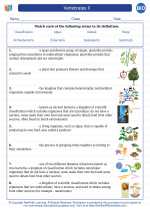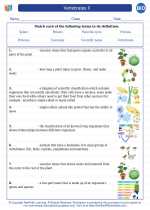Impurities in Biology
Definition: In biology, impurities refer to substances that are present in a biological system but are not part of the primary components or structures.
Types of Impurities
Impurities in biology can be categorized into several types:
- Environmental Impurities: These are substances that enter a biological system from the external environment, such as pollutants, toxins, or foreign particles.
- Metabolic Impurities: These are byproducts of metabolic processes within an organism, such as waste products and excess substances that need to be excreted.
- Genetic Impurities: These are genetic mutations or abnormalities that can lead to the presence of atypical or abnormal substances in an organism.
Effects of Impurities
Impurities in a biological system can have various effects, including:
- Disruption of normal biological processes
- Toxicity and harm to the organism
- Impact on genetic stability and inheritance
- Contribution to disease development
Study Guide
To study the topic of impurities in biology, consider the following key points:
- Understand the different types of impurities and their sources.
- Explore the effects of impurities on biological systems and organisms.
- Learn about the mechanisms of detoxification and elimination of impurities in living organisms.
- Examine specific examples of impurities and their impact on human health and the environment.
- Consider the role of genetics and mutations in the presence of impurities in organisms.
By mastering the concept of impurities in biology, you will gain insight into the delicate balance and resilience of living systems in the face of external and internal challenges.
.◂Biology Worksheets and Study Guides High School. Vertebrates II
Worksheet/Answer key Vertebrates II
Vertebrates II  Worksheet/Answer key
Worksheet/Answer key Vertebrates II
Vertebrates II  Worksheet/Answer key
Worksheet/Answer key Vertebrates II
Vertebrates II  Vocabulary/Answer key
Vocabulary/Answer key Vertebrates II
Vertebrates II  Vocabulary/Answer key
Vocabulary/Answer key Vertebrates II
Vertebrates II  Vocabulary/Answer key
Vocabulary/Answer key Vertebrates II
Vertebrates II 

 Worksheet/Answer key
Worksheet/Answer key
 Worksheet/Answer key
Worksheet/Answer key
 Vocabulary/Answer key
Vocabulary/Answer key
 Vocabulary/Answer key
Vocabulary/Answer key
 Vocabulary/Answer key
Vocabulary/Answer key

The resources above cover the following skills:
LIFE SCIENCE (NGSS)
Ecosystems: Interactions, Energy, and Dynamics
Students who demonstrate understanding can:
Use mathematical representations to support and revise explanations based on evidence about factors affecting biodiversity and populations in ecosystems of different scales.